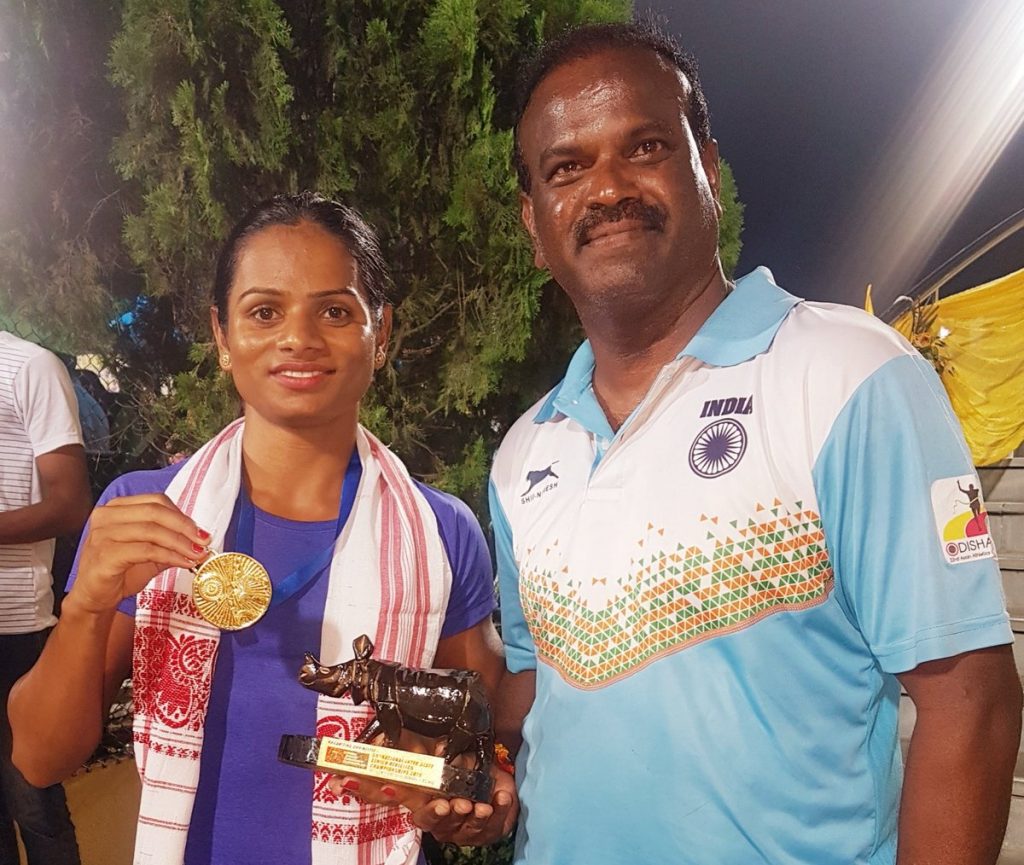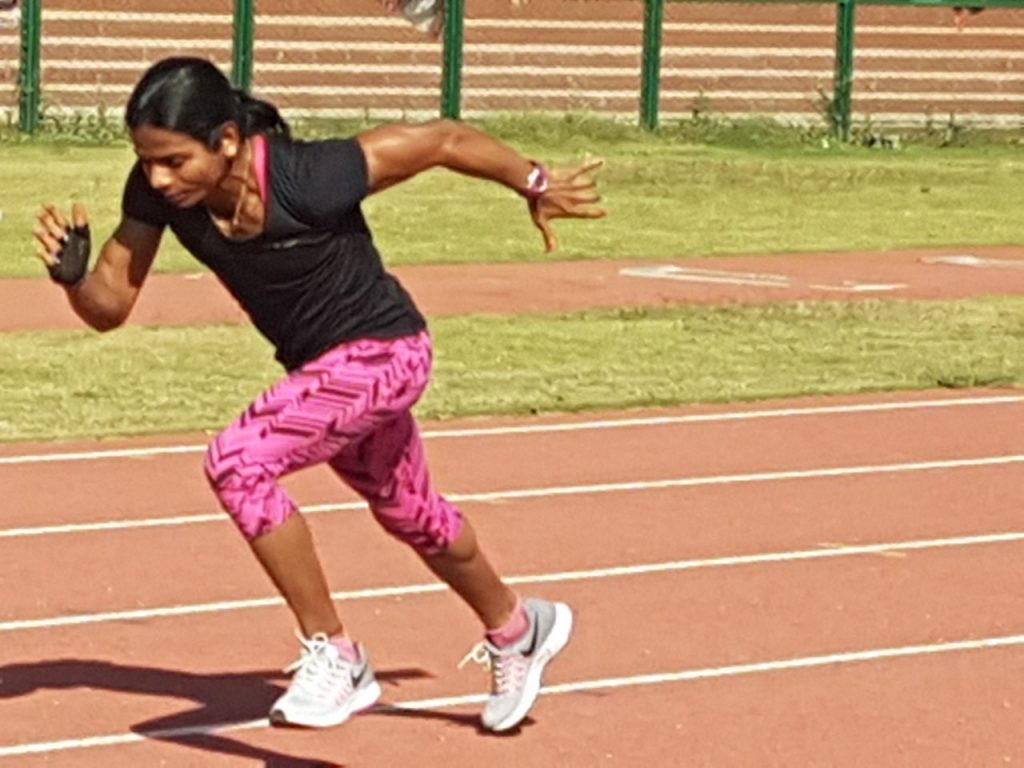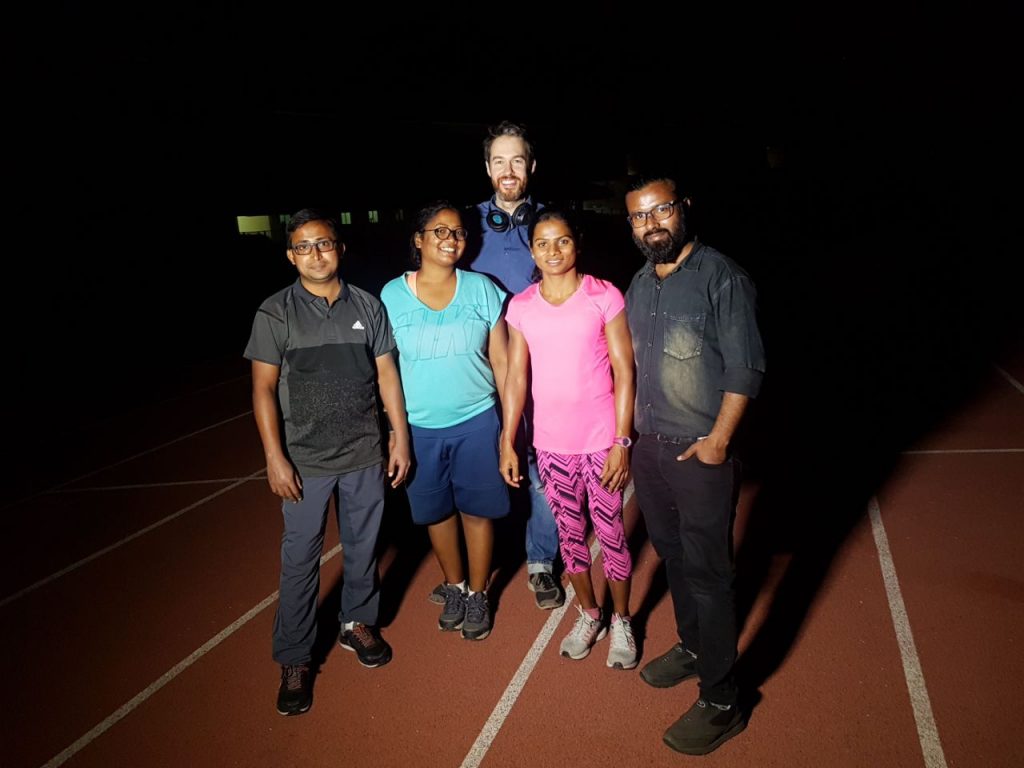She was driven straight to the State Secretariat where Chief Minister Naveen Patnaik felicitated her and handed a Rs 3 crore cash reward for her stellar performance.

Dutee finished India’s long wait for a medal in the 100-m sprint, 36 years to be exact after PT Usha who had won the Silver in 100-m and gold in the 200-m sprint in the 1982 Asian Games in New Delhi. Dutee became the first woman sprinter from Odisha to have won two medals in her debut appearance at the Asian Games and the second in the country after PT Usha.
The second fastest woman in Asia following her win in the 100-m with a timing of 11.32 seconds, Dutee is the third Indian woman athlete ever to qualify for the 100-m event at the Summer Olympics Games.

The last four years have not been easy for this daughter of a weaver of Chaka Gopalpur in Jajpur district of Odisha, who practically lived in her track pants and running gear.
Earlier Years
Dutee belongs to a poor weaver’s family. She has seven siblings including six sisters and a brother. Chaka Gopalpur is a village located on the banks of the Brahmani River, where the sprint queen practiced.
What with so many mouths to feed, Dutee’s family figured in the Below Poverty Line category. Dutee started running at the age of four. She had to run barefoot for years because she could not risk wearing out her only pair of school sandals.

“Expecting a son, we had six daughters. But now, the daughters are gems for us whereas our son is not living with us,” said Dutee’s mother.
Dutee’s source of inspiration has been her elder sister Saraswati Chand, also an athlete. In 2012, Dutee Chand became a national champion in the under-18 category, clocking 11.8 seconds in the 100-m event. With a timing of 23.811 seconds, she won the Bronze in the Women’s 200-m event at the 2013 Asian Athletics Championships in Pune. The year also saw her become the first Indian to reach the final of a global athletics 100-m final, when she made it to the final in the 2013 World Youth Championships.
The same year, Dutee became a national champion in 100-m and 200-m by winning the events clocking 11.73 seconds in the final in 100-m and a career best of 23.73 seconds in 200-m at the National Senior Athletics Championships in Ranchi.
The Turbulent 2014
In 2014, Dutee, who had only a month ago won two gold medals at the Asian Junior Athletics Championship in Taipei, was told that she wouldn’t be considered for selection for the Commonwealth Games in Glasgow.
Only18 at that time, she was shocked when a doctor at the Sports Authority of India (SAI) centre in Kengeri, near Bengaluru informed her about excess androgen (specifically testosterone) in her blood sample.
The sport’s governing body informed her that she would be permanently banned from competition unless she undertook a surgery or other medical steps to alter her body chemistry.

The International Association of Athletics Federations (IAAF) ruled that she had failed a test for hyperandrogenism because her natural testosterone level was too high for her to be considered a woman.
Hyperandrogenism is a medical condition characterised by excessive levels of male sex hormone in the female body.
When the South African runner Caster Semenya faced a similar controversy in 2009, her country stepped up to defend her and filed a human rights complaint with the United Nations.
However, India did not seem prepared to fight for Dutee.
A determined Dutee took the matter to the Court of Arbitration of Sport (CAS) against the Athletics Federation of India and International Association of Athletics Federation (IAAF).
The Sports Authority of India (SAI), who had conducted the initial tests on her, continued to back her, calling IAAF’s policy ‘unscientific, unfair and unethical.’
Dutee wanted to prove that testosterone that is naturally produced by the human body did not have a similar effect as ingesting steroids to enhance performance.
After a year-long fight, CAS conceded that testosterone levels in males are the main factor in deciding the athlete’s performance and it offers a competitive advantage over female athletes. The separation between men and women based on this, is therefore, justified.
The verdict was in Dutee’s favour and it was decided that she could continue to be a part of national and international events.
The Phoenix Rises Again
Dutee started taking part in track competitions after the verdict in 2015. She participated in the 2016 Asian Indoor Athletics Championships in 60-m. She created a national record with a timing of 7.28 seconds in the qualification round and went on to win a Bronze in the final, clocking 7.37 seconds.

Dutee clocked 11.33 seconds in the women’s 100-m dash to win the Gold and erase Rachita Mistry’s 16-year-old earlier national record of 11.38 seconds in the 2016 Federation Cup National Athletics Championships in New Delhi.
On June 25, 2016, Dutee broke the very same national record twice in one day after clocking 11.24 at the XXVI International Meeting G Kosanov Memorial at Almaty, Kazakhstan, thereby qualifying for the Olympic Games.

At the Rio 2016 Olympics, she became the third Indian woman to participate in the women’s 100-m event though she did not move beyond the heats, where she clocked 11.69 seconds.
Despite being the first woman to represent India in the Olympics sprint event in 36 years, Dutee was made to feel isolated due to her condition of hyperandrogenism.
In 2017, at the Asian Athletics Championships, she clinched two Bronze medals, one in the women’s 100-m and another in the women’s 4×100-m relay with Srabani Nanda, Merlin K Joseph and Himashree Roy in Bhubaneswar.
She became the second fastest runner in Asia after winning a Silver in the women’s 100-m on August 26, clocking 11.32 seconds. She lost the Gold by 0.02 seconds.
The 22-year-old athlete bagged her second Silver medal in the 200-m event, clocking 23.20 seconds. She finished behind Bahrain’s Edidiong Odiong, who clinched the Gold in 22.96 seconds.

Future Plans
Dutee said, “I always accept challenges. I will focus on the 2020 Olympics now.”
Chief Minister Naveen Patnaik announced that the state government would bear the expenses of her preparations for the Olympics.
Dutee’s coach, N Ramesh said she would now aim to run 100-m in less than 11 seconds to be able to stand a chance and win a medal at major global events.



